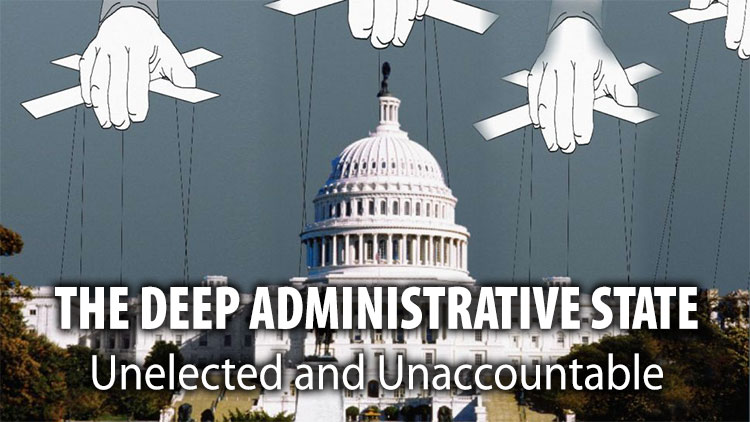SCOTUS Rules Unelected Bureaucrats Do Not Have the Power to Create Laws
Chevron is Gone

Supreme Court Delivers Crippling Blow
to Permanent Bureaucracy’s Power Over Our Lives
In a landmark decision, the Supreme Court has overturned the long-standing Chevron doctrine, fundamentally altering the balance of power between the judiciary and federal agencies.
The ruling, which came in the case of Loper Bright Enterprises et al. v. Raimondo, Secretary of Commerce, et al., marks a significant shift in the balance of power between the branches of government.
The Chevron doctrine, established in the 1984 case Chevron U.S.A. Inc. v. Natural Resources Defense Council, has long been a source of contention. It granted deference to federal agencies in interpreting ambiguous statutes, effectively allowing unelected bureaucrats to make laws through their regulatory actions.
However, by a 6-3 majority, the SCOTUS has now declared that such power is unconstitutional and goes against the principles of democratic governance.
“Chevron is overruled,” Chief Justice John Roberts wrote in his majority opinion. “Courts must exercise their independent judgment in deciding whether an agency has acted within its statutory authority.”
Chief Justice Roberts, emphasized that the role of interpreting laws and making policy decisions should rest with elected representatives in Congress, not with unaccountable agency officials. The ruling has been hailed by critics of regulatory overreach as a victory for the separation of powers and the rule of law.
SCOTUS Blog reported:
Chevron, Roberts explains, “defies the command of” the Administrative Procedure Act, the law governing federal administrative agencies, “that the reviewing court–not the agency whose action it reviews–is to decide all relevant questions of law and interpret … statutory provisions. It requires a court to ignore, not follow, the reading the court would have reached had it exercised its independent judgment as required by the APA.”
Chevron’s presumption that statutory ambiguities are implicit delegations of authority by Congress to federal agencies “is misguided,” Roberts explains, “because agencies have no special competence in resolving statutory ambiguities. Courts do.”
Roberts notes that today’s decision does “not call into question prior cases that relied on the Chevron framework. The holdings of those cases that specific agency actions are lawful–including the Clean Air Act holding of Chevron itself–are still subject to statutory stare decisis despite our change in interpretive methodology.”
The decision comes with the concurrence of Justices Thomas and Gorsuch, who added their perspectives, underscoring the constitutional necessity of judicial independence in statutory interpretation.
“Justice Neil Gorsuch, the son of a former Environmental Protection Agency administrator, wrote separately to call Chevron Deference “a grave anomaly when viewed against the sweep of historic judicial practice,” according to CNN.
“The 1984 decision, he said, “undermines core rule-of-law values ranging from the promise of fair notice to the promise of a fair hearing,” adding that it “operated to undermine rather than advance reliance interests, often to the detriment of ordinary Americans,” the news outlet added.
This is a massive win for the Constitution. This is a massive win for the American people.
Leftist Laurence Tribe wrote, “Chevron is now overruled. The administrative state just died. The imperial judiciary joins the imperial presidency, relegating Congress to a secondary role except when it legislates with unrealistic specificity and foresight.”
Chevron is now overruled. The administrative state just died. The imperial judiciary joins the imperial presidency, relegating Congress to a secondary role except when it legislates with unrealistic specificity and foresight.
— Laurence Tribe 🇺🇦 ⚖️ (@tribelaw) June 28, 2024
“For far too long, the Chevron doctrine has allowed D.C. bureaucrats to go unchecked. Today’s SCOTUS ruling restores decision-making powers back into the hands of lawmakers who answer to the American people, not unelected Biden bureaucrats,” Sen. Cynthia Lummis wrote.
For far too long, the Chevron doctrine has allowed D.C. bureaucrats to go unchecked. Today’s SCOTUS ruling restores decision-making powers back into the hands of lawmakers who answer to the American people, not unelected Biden bureaucrats. pic.twitter.com/GKhnXl1DQt
— Senator Cynthia Lummis (@SenLummis) June 28, 2024
Goodbye Chevron deference, hello again, Constitution!
— Mike Lee (@SenMikeLee) June 28, 2024
Unelected bureaucrats cannot make the law, and our courts can once again protect the American people from them. https://t.co/eW7mAqSehf
Ron De Santis weighed in, writing, “The Chevron doctrine distorted the constitutional separation of powers and helped create the unaccountable, bloated administrative state. This decision is a necessary corrective to decades of wayward constitutional jurisprudence but is, by itself, not enough to restore the proper roles of the federal government’s three branches, which will require Congress to take its obligations under Article I of the Constitution more seriously by using its law-making and spending authority to rein in the federal bureaucracy.”
The Chevron doctrine distorted the constitutional separation of powers and helped create the unaccountable, bloated administrative state.
— Ron DeSantis (@GovRonDeSantis) June 28, 2024
This decision is a necessary corrective to decades of wayward constitutional jurisprudence but is, by itself, not enough to restore the… https://t.co/AbEw8t3s03





















